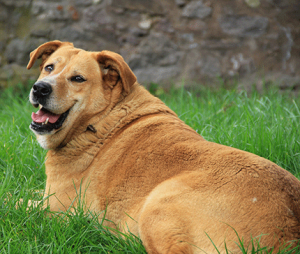One of the many tasks that Goddard veterinary nurses can help you with is advice and guidance on your pet’s weight. Of course, humans can adjust their diets and eat healthily (or try to) but our four-legged friends rely on us to help keep them trim and a good weight. 
The problems with portly pets.
The news, it seems, is full of the problems with overweight humans and the health risks obesity carries. The same applies to our pets, having an overweight pet seriously increases the risk factor in a number of health conditions, including:
? Arthritis and joint problems from carrying excess weight
? Heart disease from the heart muscle having to work harder
? Liver disease from Fatty Liver Syndrome
? Cystitis
? Diabetes
Also noticeable may be the pet’s fur, seemingly unkempt, even matted – this is because overweight pets have trouble reaching the parts they used to when grooming themselves. All this amounts to a very unhappy pet that can have a shortened lifespan.
Is there an ideal weight for my pet?
Having an ideal weight for your pet is not a simple as choosing a figure and sticking into that. Every pet is different! As an example, there are guidelines to say a cat should weigh around 4 to 6 kilograms or a Border collie no more than 20 kilograms. These are just guidelines as even pets of the same breed can be different, it is not so much an ideal weight as more a healthy weight! Factors including the sex of the animal also need taking into account – something our nurses will do during an initial weight check.
How do your nurses check a pet is a healthy weight?
Our nurses (and vets) use a system called a body condition score, This is because there is one healthy shape associated with many species.
During your pet’s weight check, our nurses will demonstrate how to check your pet’s body condition and the shape to look for. It is very simple and just means running your hands over their chest and back. Pets that have an ideal body condition will be able to have their rib cage felt easily with the tips of the fingers. That area should just have a slight fat layer covering, with the outline of one or two ribs possibly showing. Our nurses will also explain the shape of your pet from above and the side, and what you should be looking for.
How do I know my pets on the right diet?
That is another article in itself! There are hundreds of diets on the market for pets, including breed specific formulas. Ensuring that your pet gets the correct nutrition of carbohydrate, protein, fats, vitamins and minerals can be really difficult. If your pet is a rabbit, the correct amount of quality grass and hay also needs to be added to the equation.
The veterinary nursing teams at Goddard vets, are more than happy to assess your pet’s body score and talk to you about their dietary needs.
It is not a cliche about any species that has too many calories and not enough exercise – they will become fat! Pets can also become quite fussy eaters. How many different diets have you tried to feed your pets? Cats that totally ignore the food that they ate happily a few days before, or rabbits fed a muesli type mix that choose the tastiest and normally most unhealthiest bits to eat first. Our advice extends to them all.
And talking of exercise…
Pets can burn off those calories with a good amount of exercise. With dogs this is normally easy as they are usually happy to go for a walk or run, but with cats or bunnies it’s more difficult.
Some owners are brave and will put their cat or rabbit on a lead – but they are very much the minority, that means the best way for them to exercise is through play.
How many toys are there for cats and rabbits? Look around any pet store and there are shelves full of them. Cats love to chase and pounce using their natural hunting instinct and any ‘toy-prey’ will do – even paper balls. Rabbits like to climb, use tunnels, and even have their own toys. It’s up to owners to encourage them – and our nurses will support you with ideas and tips.
Keeping your pets at a healthy weight includes everything above and our nurses and vets are happy to support you with advice on weight and managing your pet when it comes to nutrition. Call your local surgery for more information and let’s help keep Britain’s pets healthy!
